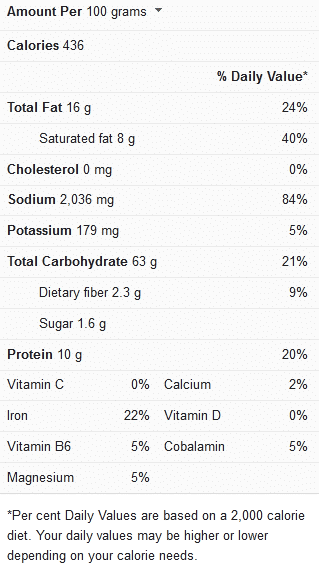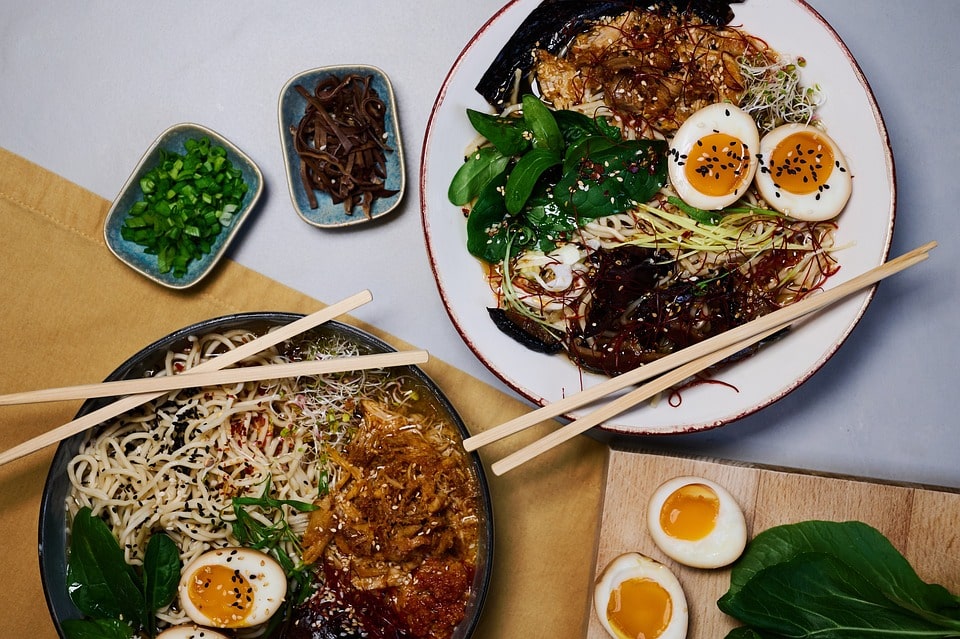Updated on October 14th, 2022
When cooking eggs, whether boiled (hard, medium, soft), fried, scrambled, and so on, it always comes out right when done properly. Scrumptious yet amazingly simple to cook, ramen eggs are traditionally referred to as “Ajitsuke Tamago,” meaning “a flavored infused egg” made in marinate. Actually, it’s not just the flavor that goes into the eggs; it’s also about the texture of the egg as well and since it’s mainly served with ramen.
Ramen is a very textural dish since you spend a lot of time trying to get the noodles and texture of the broth right. You’ll want your egg yolks to be thick and jelly-like while the egg whites firmer. Before you think it’s going to be challenging, make sure you go through this article. It provides easy and suitable cooking directions and guidelines that’ll ensure perfectly cooked ramen eggs.
Ramen Nutrition Facts

Cooking Tips for Ramen Eggs
The following tips and procedures are essential to note whenever you’re cooking your Ajitsuke Tamago:
Boiling eggs to precision – Here, it basically involves how you control the temperature of the water used in boiling the eggs, noting how long the eggs take to boil and the type of eggs used. Getting a precision boiled egg is all about the time and temperature, and we recommend you use boiling water close to 100°F.
Poke a small hole in the base of the eggs – This is one of the most important things to do when cooking ramen eggs. Firstly, what this does is that it releases the air pocket in eggs as it boils in the pot, and secondly, it also makes the eggs much easier to peel.
Stir the eggs in the pot – Stir the eggs as it boils but just for the first minute. This allows the air in the eggs to escape and centers the egg yolks, so you don’t get it at the sides of the egg whites.
Marinate your eggs – An affordable marinade to use for ramen eggs include soy sauce, mirin (Japanese sweet wine), sugar, umami flavorings, and a few cups of water. The marinade used here does not require any form of heating, so it’s pretty much simple to prepare. However, if you prefer adding more seasonings like curry, garlic, chili powder, etc., you might need to heat the soy sauce mixture to ensure the flavors are thoroughly mixed.
After boiling and peeling your eggs, all you’re expected to do is to mix the marinade ingredients together in a clean bowl, add the cups of water, and place boiled eggs into the marinade. Note, if you heated up the marinade, remember to allow it to cool off for some minutes at room temperature before placing the eggs into it to avoid cooking it all over again. Place your marinated egg mix in the refrigerator and marinate for a minimum of 3 hours and a maximum of 12 to 24 hours. Then remove and cut the eggs in half.
Recommended cooking equipment – The following are the basic equipment you can use for cooking ramen eggs:
- A digital timer – This helps track the cooking time for your eggs, so you don’t over or under cook them unknowingly. Also, if you’re using smaller or larger eggs, you might just need to adjust the timer and temperature.
- A floss or fishing line to cut eggs through
- A long wooden spoon – To help remove the eggs from the pot to the ice bath
- Large sealable containers – This pretty much holds the marinated eggs regardless of the number of eggs used.
Storing eggs – Placing the eggs in the refrigerator depends entirely on whether you’re serving them immediately after cooking or at a later time. When preserved appropriately, eggs can last in the refrigerator for 5 days to 7 days at most, and even if you do refrigerate it, your eggs would still have a great taste once it’s warmed up in a bowl of hot spicy ramen.
View this post on Instagram
Cooking Time for Ramen Eggs
The appropriate time for cooking eggs to achieve that soft boiled result has been provided below:
| Cooking procedure | Cooking time |
| Boiling eggs in a pot on the stovetop at 145°F | 5 to 45 minutes |
| Cooling eggs in an ice bath | 5 to 8 minutes |
| Marinating eggs in soy sauce mirin mixture | 2 to 24 hours |
Boiled ramen eggs (4 to 6 servings)
Ingredients
- A dozen fresh eggs
- I cup of water
For marinade
- 1/4 cups of soy sauce
- 1/4 cups of mirin
- A cup of cooking sake for seasonings
- 2 tbsps of sugar
- 1 cup of dashi stock
Optional spices
- 1 tspn cayenne/chili peppers
- 2 cloves of garlic powder
- 1 tbsp of ground paprika
Instructions
- Using a spatula or wooden spoon, carefully place your eggs into a pot of boiling water. Ensure the water for boiling the eggs is able to cover them in the pot and cover with the lid. Set digital timer to cook eggs for 6 minutes at most if you’re boiling at a higher temperature of 350°F or more. Remember to stir the eggs for the first minute of cooking to ensure an even distribution of the egg yolks in the middle.
- Once the timer goes off, get the eggs straight out from the pot and into an ice bath you prepared beforehand. Stir the eggs in the ice bath for 30 seconds, then allow to cool for an additional 6 minutes as it’s believed to stop the cooking process.
- Next up, set out to make your marinade mix in a saucepan or a small size pot. Add your measurements of soy sauce, mirin, sugar, and other spices and bring to a boil over medium-high heat. Allow the marinade to cool completely for some minutes so to avoid overcooking your ramen eggs.
- Remove your eggs from the ice bath and pour the cooled-off marinade mix over it, ensuring all the eggs are totally covered in the marinade. The eggs might float at first but will sink down later on.
- Using some paper towels or a plastic wrap, cover the eggs to get them well submerged and marinate in the refrigerator for 2 to 24 hours or until you’re ready to serve. You can choose to discard or preserve the marinade mix for a later use. When serving eggs, if you cut it open into half, you will notice that the egg yolks are quite jammy and jelly like while the egg whites has developed a brownish firmer surface. Serve hot and enjoy eggs with a bowl of ramen noodles.
You can almost agree that eggs goes pretty well with noodles and cooking fresh eggs in soy sauce marinade mix is one that’s enjoyable with any bowl of ramen noodles. We believe this food recipe has been of great help to somebody, if you’ll like to get more insightful recipes for cooking eggs for ramen, you can check out more food video recipes.
